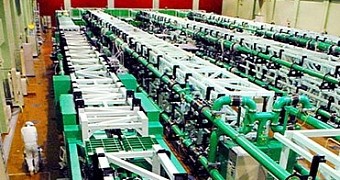Scientists from Osaka University recently fired the most powerful laser on the planet: a 2 petawatt pulse, that is 2 quadrillion watts.
However, the only thing the scientists are proud of is that the laser was fired, or at least was fired into existence, an existence that lasted only just one trillionth of a second. Called LFEX (Laser for Fast Ingnition Experiments) and is measuring a whopping 300 feet in length, it doesn't consume as much power compared with its massive output.
It seems that LFEX only consumed a couple of hundreds of joules, just as much your average microwave would consume in two seconds, but unlike your microwave, it did it in one trillionth of a second. The laser is able to generate so much power so quickly thanks to a series of glass "lamps" that amplified the laser as it passed through them.
In raw output, nothing compares with this
Although it fired only 2 petawatts, the ultimate output for the laser could be much higher, as the scientists at Osaka University plan to increase its output power to 10 petawatts. This sort of power output is immense since the latest laser output record was a test in Lawrence Livermore National Laboratory that fired 192 laser beams for just a second, infinitely more than the Japanese one, unleashing a blast of 500 trillion watts of power and consuming 1.85 megajoule.
Compare those five hundred trillion watts to LFEX's two quadrillion watts and the power they need to unleash their lasers, and it quickly becomes obvious why the LFEX is so impressive from an economic standpoint. A couple of hundreds of joules compared to a million and half will make a serious difference on the energy bill.
Nonetheless, it remains to be seen what the ultimate purpose of the LFEX will be since it's still in experimental phases with very limited performance time. Unless it has any immediate military applications, it's hard to see how this powerful laser will receive funding on the long term to reach full maturity.

 14 DAY TRIAL //
14 DAY TRIAL //